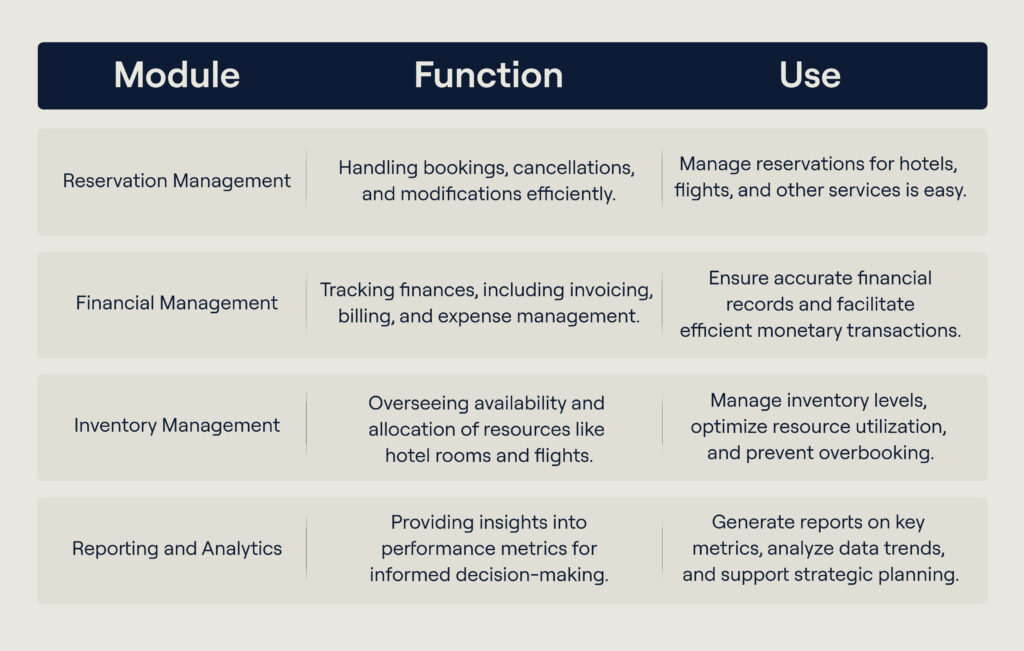Frequently asked questions about travel software – ERP
13 questions travel agencies and travel management companies frequently ask when they consider investing in a (new) ERP/mid & back-office system.

What to expect from this article
This article answers 13 questions travel agencies and travel management companies frequently ask when they consider investing in a (new) ERP/mid & back-office system. Whether you’re looking to improve efficiency or enhance customer experiences, the Q&A can help you choose the best travel software solution for your business needs.
Learn more about the related products
Q: What is the primary purpose of implementing an ERP system in a travel agency?
A: The primary purpose of implementing an ERP system in a travel agency is to streamline workflows, centralize data management, improve efficiency, reduce costs, enhance customer service, and provide better control over business strategies. TMCs can use data from ERP systems to offer added services to business travel customers by optimizing operations and planning effectively.
Q: How can ERP software improve operational efficiency in travel businesses?
A: By integrating various processes into a unified platform through streamlined automation and centralized data management, ERP systems enable quick access to real-time information for faster decision-making and resource allocation.
Q: What specific modules are typically included in ERP systems for the travel industry?
A: ERP systems for the travel industry typically include several specialized modules to effectively manage key aspects of operations. See below illustration for an example of the most common modules.

Q: What are the key challenges for a travel company during the implementation of ERP system?
A: Key challenges include poorly determined parameters, heavy and strict implementation processes, difficulties faced by the team in using the system, the necessity of adapting organizational processes to the software, ongoing maintenance requirements, and the potential difficulty in changing the chosen solution.
These challenges highlight the importance of establishing clear business goals, planning training, and allocating a budget accordingly to ensure the successful adoption and utilization of the ERP system. By addressing these challenges proactively, travel companies can overcome obstacles and maximize the benefits of ERP software in streamlining operations and enhancing efficiency.
Q: What role does data analytics play in ERP systems for the travel industry?
A: Data analytics in ERP systems acts as a super-smart travel guide which helps travel agencies understand all the information about customers, where they want to go, when they want to travel, and what they like to do. This helps you plan better by predicting demand, managing inventory, and setting prices. Data analytics essentially helps you make smarter decisions, enabling you to provide the best possible experience for your travelers.
Q: How does ERP software support compliance with regulatory requirements in the travel sector?
A: ERP software will help organize and manage data to ensure adherence to rules and regulations making sure customer data is protected and financial transactions are transparent. Travel companies can easily track and manage data related to bookings, finances, and customer information, ensuring you meet all legal requirements easily.
Q: How do ERP systems protect sensitive customer data?
A: In ERP systems, security measures encryption, access controls, and regular updates help the safety of sensitive customer data. These measures restrict access to authorized users only, preventing unauthorized access or breaches. Additionally, features like audit trails monitor data access, adding an extra layer of security. With these measures, ERP systems actively safeguard customer data and maintain trust.
Q: How does ERP software assist with financial management and reporting in travel companies?
A: ERP software helps travel companies manage finances better by organizing all financial data in one place. The system tracks expenses, invoices, and revenue streams, providing real-time insights into the company’s financial health. With built-in reporting tools, the system generates detailed financial reports, simplifying the process of analyzing financial performance and making informed business decisions by saving time and improving accuracy.
Q: Can ERP systems integrate with third-party booking platforms and distribution channels?
A: Yes, ERP systems can connect with other booking platforms and GDS. This integration helps your travel business manage bookings efficiently and reach your customers across various channels without any hassle.
Q: Can ERP systems integrate with BSP and ARC?
A: Absolutely! ERP systems seamlessly integrate with BSP and ARC. This integration enhances operational efficiency and simplifies financial management for your travel agency, enabling you to prioritize delivering exceptional travel services to your customers.
Q: Is it expensive to implement a new ERP system in my travel business?
A: The cost of implementing a new ERP system in your travel business depends on which system you choose. It can vary based on factors like the size of your business, the features you need, and whether you choose a basic or more advanced system. So, it’s not a one-size-fits-all answer. You’ll need to research different options and get quotes to find out what fits your budget best.
Q: Does an ERP system support operations in multiple countries?
A: Yes, an ERP system can support operations in multiple countries for travel agencies. It enables you to manage various aspects of the business, including reservations, customer information, and financial transactions, across different countries and regions. This capability is crucial for travel agencies with a global presence or those serving clients who travel internationally.
Q: Is it possible to integrate mid-office functionality into the ERP system?
A: Yes, it’s possible to integrate mid-office functionality into the ERP system for a travel agency. This integration helps streamline operations by bringing together important functions like customer data, and financial tracking into one system which can handle tasks like booking processing, customer inquiries, and financial reporting, all from a single platform.
Do you have questions that were not asked in the FAQ? Send us an email and we will do our best to answer your questions.
Looking for more inspiration?
Discover articles, guides, and customer stories
-

Why most travel agencies are not ready to succeed with AI
AI promises more than most travel agencies will be able to realize today.
-

Customer story: Wings Global Travel
Building global scalability with TravelOperations and Microsoft Dynamics 365
-

What’s next for travel? Travel industry insights 2025
Discover the top travel industry trends for 2025 & 2026: From solo travel to smart tech and sustainability.